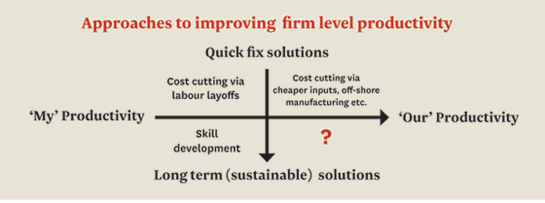Rationale
Why look at firm level productivity?


Traditionally, productivity is viewed either as an economic measure of a nation's output relative to inputs, such as in the OECD's productivity standings, or as the result of individual employee efforts within a firm. Strategies for improving productivity within firms have generally focused on individual employees, with solutions to productivity issues ranging from quick fix cost cutting measures, to the long term skill development of individual employees.
Reports suggest that until recently, productivity improvements have generally been sought through lowering costs including through the reduction of staff numbers. From the mid 1990's, solutions to improving productivity began to emphasise skill development in an effort to create superior 'human capital' resources to help realise a firm's product/market strategy.
Now we wish to find longer-term solutions to firm level productivity issues that focus on collective efforts and use intangible capitals, such as explicit and tacit knowledge (intellectual capital), identity and branding (symbolic capital), and relationships and networks, (social capital). Developing these should enhance collective productivity and enable firms to better employ their resources.
